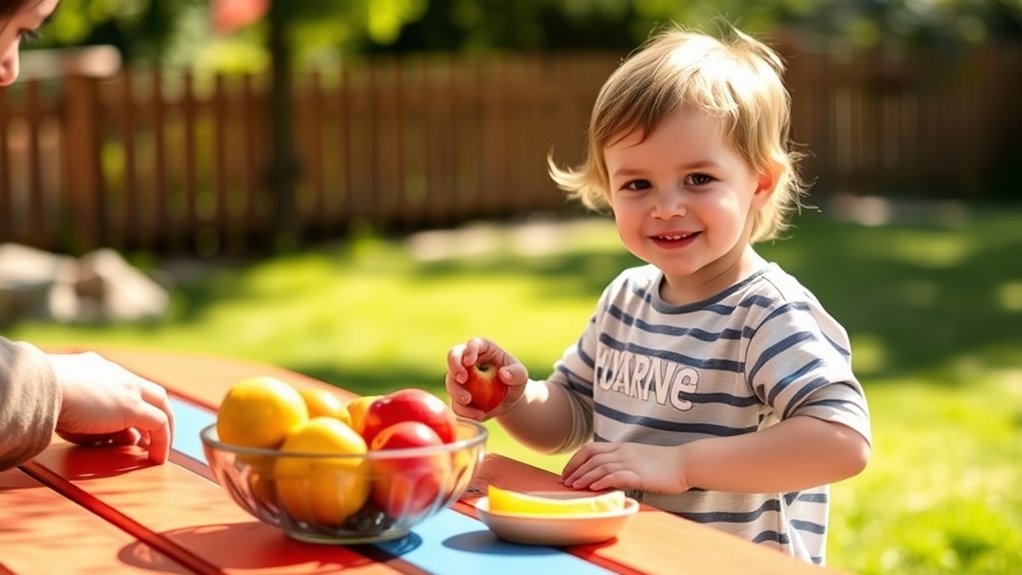Encouraging your child’s independence starts with giving them simple choices, like picking their clothes, snacks, or activities. This helps build their confidence and teaches them to contemplate options and consequences. Be patient and offer positive praise to reinforce their efforts. Trust-building activities, like planning outings or organizing their space, further promote independence. Keep supporting their decision-making, and you’ll help them develop essential life skills; discover more ways to foster independence by exploring additional strategies.
Key Takeaways
- Offer children simple choices, like clothing or snacks, to foster decision-making skills and independence.
- Praise efforts and progress to build confidence and encourage continued participation in decision-making.
- Support children in weighing options and considering consequences to develop critical thinking.
- Involve kids in planning family activities or organizing their space to promote ownership and responsibility.
- Be patient and reinforce that making mistakes is a natural part of learning and growth.

Encouraging kids to become independent helps them build confidence and develop essential life skills. One of the most effective ways to do this is by involving them in decision-making activities. When you give children opportunities to make choices, you empower them to take ownership of their actions and build trust in their abilities. Trust building activities are a great way to foster a sense of security, showing your child that their opinions matter and that you support their growing independence. These activities don’t have to be complicated; simple decisions like choosing what to wear, what snack to eat, or which game to play can make a significant difference in how your child perceives their own decision-making skills.
By encouraging your child to weigh options and consider consequences, you help them develop decision-making skills that are vital for their overall growth. For example, you might present two healthy snack options and ask which they prefer, guiding them to think through their choice. Over time, these small decisions add up, giving your child the confidence to handle more complex situations later on. It’s important to be patient and supportive during this process, praising their efforts regardless of the outcome. This positive reinforcement reinforces that their decisions matter and that mistakes are part of learning.
Incorporating trust building activities into daily routines can also help your child feel more comfortable making independent choices. Activities like planning a family outing together or letting them decide how to organize their room give them a sense of control and responsibility. These experiences teach them that their input is valuable and that they can influence their environment positively. As your child practices decision making, you can introduce scenarios where they need to think critically or problem-solve, further sharpening their skills. For instance, if they’re struggling with a conflict with a friend, guiding them through the process of finding a solution encourages both trust and independence. Additionally, understanding the importance of space and organization can help children learn to manage their belongings responsibly, further fostering independence.
Frequently Asked Questions
How Early Can Children Start Making Choices Independently?
Children can start making simple choices as early as 12 months old, helping their decision-making development and marking early independence milestones. At this stage, they might choose between two toys or snack options. As they grow, their ability to make decisions improves, fostering confidence and independence. You can support this by offering age-appropriate choices, encouraging them to express preferences, and gradually increasing their decision-making responsibilities.
What if a Child’s Choices Lead to Undesirable Outcomes?
Think of guiding your child as steering a boat through foggy waters. When their choices lead to undesirable outcomes, you help them navigate by discussing risk management and decision consequences. Instead of steering for them, show how each decision has a ripple effect, teaching them to weigh options carefully. This approach empowers kids to learn from mistakes, building resilience and better judgment for future choices.
How Can Parents Balance Guidance and Independence Effectively?
You can balance guidance and independence by setting clear decision boundaries while respecting your child’s growing autonomy. Maintain your parental authority by calmly explaining the reasons behind limits, and encourage them to make choices within those boundaries. When they face undesirable outcomes, use it as a learning opportunity rather than punishment. This approach fosters decision-making skills and independence, all while ensuring they stay within safe and appropriate limits.
Are There Specific Types of Choices Suitable for Different Ages?
Yes, there are age-appropriate options for different ages to help develop decision-making skills. For young children, offer simple choices like snack options or clothing, fostering early independence. As they grow, introduce more complex decisions, such as selecting extracurricular activities or homework routines. Tailoring choices to their developmental stage encourages confidence, sharpens decision-making skills, and balances guidance with independence, setting a foundation for responsible decision-making in the future.
How to Handle Disagreements Over Choices Made by Children?
When disagreements arise over your child’s choices, calmly discuss their reasoning to understand their perspective. Set clear boundaries to prevent peer pressure from influencing their decisions and help them recognize when decision fatigue might impair judgment. Encourage open communication, validate their feelings, and guide them to contemplate consequences. By fostering a supportive environment, you empower your child to develop confidence while learning to manage conflicts constructively.
Conclusion
By giving kids opportunities to make choices, you’re helping them build confidence and independence. It’s about trusting them to learn from their decisions and supporting their growth every step of the way. Remember, isn’t it more rewarding to see your child develop self-reliance and decision-making skills firsthand? When you encourage their independence through simple choices, you’re setting the foundation for a confident, capable, and resilient individual. So, why not start today and watch them thrive?










